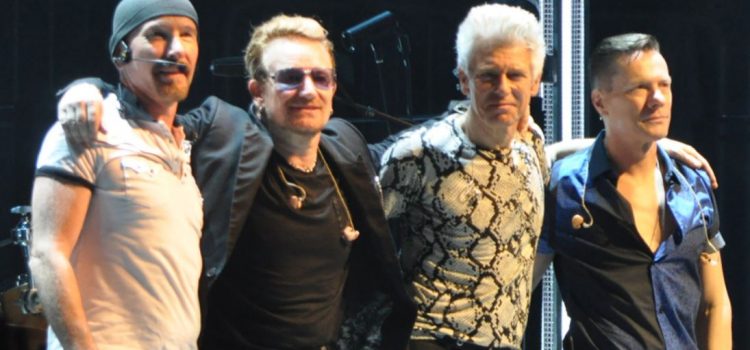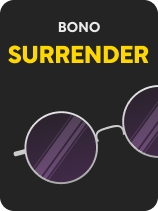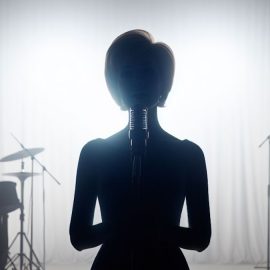

This article is an excerpt from the Shortform book guide to "Surrender" by Bono. Shortform has the world's best summaries and analyses of books you should be reading.
Like this article? Sign up for a free trial here.
What genre is U2? How has their genre changed over the years?
U2’s genre is a mixture of pop and electronica, and it developed from an absurdist reaction to garage band-style punk and heavy metal. Bono discussed how and why they kept changing their sound in his book Surrender.
Let’s take a look at how U2’s genre changed over time and where it settled.
Understanding U2’s Sound
In his memoir, Surrender, Bono admits his obsession with constantly reinventing U2 and its music, in part to avoid becoming a band that only recycles its old greatest hits. As examples of his quest for reinvention, he brings up the stress of finding a new sound for the ’90s, the absurdist stage show that followed as a result, and the back-to-basics approach U2 adopted in the 2000s. So when answering the question, “What genre is U2?” you need to take a look at its history.
Bono writes that making the album Achtung, Baby was a particularly difficult time for the band. To record it, they arrived in Berlin exactly one year after the Berlin Wall came down. They had nothing written except some vague ideas and a wish to shed the ponderous seriousness that had come to define them and their music. Bono wanted to experiment with new musical arrangements and technological effects, but the process of improvising an album turned out to be much harder than expected. Bono takes responsibility for straining his relationship with the band, but the end product was an album they’re all proud of.
(Shortform note: The wall dividing Communist-controlled East Berlin and the capitalist city of West Berlin was built in 1961 during the height of the Cold War. As tensions between the East and West relaxed, the wall was opened for unrestricted travel between the cities on November 9, 1989. U2’s arrival date that Bono refers to was nearly a year later, when East and West Germany were politically reunited. Despite the difficulties Bono describes with writing and recording Achtung, Baby, the album is remembered both as one of U2’s best and also as a complete reworking of their sound.)
Though Achtung, Baby became a touchstone of the ’90s, the tour that went with it was a reaction against the garage-band aesthetic of the grunge movement. Though Bono enjoyed and appreciated grunge, its drab and serious undertones weren’t what U2 needed at the time. Dubbed “Zoo TV,” the Achtung, Baby tour featured a giant television with real-time channel surfing, and Bono adopted what he considers his most clownish stage persona ever. As part of his act, during every concert, Bono would crank-call the White House and ask to speak to President George H.W. Bush.
(Shortform note: The grunge movement that Bono says he played against with the Zoo TV tour was a fusion of punk rock and heavy metal that rose from the Seattle music community in the late 1980s. Though relatively short-lived as a musical style, grunge had a heavy influence on mainstream rock music and fashion in the 1990s. While not latching onto U2’s anti-grunge reaction, critics recognized the Zoo TV tour as a mockery of the excessive rock n’ roll lifestyle. In recompense for repeatedly annoying White House telephone operators with his on-stage calls, Bono invited them to be guests at a concert, flown there at U2’s expense.)
A Changing Style
Throughout the ’90s, U2 would veer even more heavily toward electronic music and pop, to limited critical and commercial success. In the early 2000s, the band returned to its roots, in part because of the death of Bono’s father. Bono writes that while dealing with his father’s illness, he stopped pushing the band in new directions so they could relax and find their most authentic sound. Doing so brought U2 a new wave of acclaim with the album All That You Can’t Leave Behind, including songs (such as “Beautiful Day”) about finding joy amid heartache.
(Shortform note: While critics recognized U2’s new album as a return to their classic form, it was also their first in the digital music era. At the time, the music industry was hurting from a wave of music piracy enabled by the file-sharing app Napster, and two weeks prior to their album’s release, U2’s new songs were leaked online. As he describes in his memoir, Bono’s lyrics about navigating loss were inspired by his dealing with his father’s mortality, but the album took on new meaning for fans after the terror attacks of 9/11. All That You Can’t Leave Behind’s hopeful undertones served as a light for some listeners during that period, as did U2’s tribute to the 9/11 victims during the 2002 Super Bowl championship of the US’s National Football League.)
U2 made a splash with new fans when they offered their 2004 single “Vertigo” to be used in a video promoting the iPod music player, the first use of any of their songs in a commercial. While the song and the iPod were hits, their next collaboration with Apple didn’t go so well. To promote 2014’s Songs of Innocence, they made a deal to give the album for free to all iPod users. Bono says they thought people would see it as a gift, but instead they sparked a wave of angry customers whose devices now contained a product they hadn’t ordered, crossing a line of digital privacy. While Bono regrets the decision, Apple shrugged it off as a worthy, if failed, musical experiment.
(Shortform note: While Bono accepts the blame for the free album debacle, he doesn’t go into the reasons why it angered Apple customers. Many felt that having content they didn’t purchase automatically downloaded to their devices was an invasion of privacy—U2’s album may have been much more welcome had users been given the option to download it. The free album also highlighted the control that tech companies have over digital content, much like Amazon did in 2009 when it suddenly removed digital copies of George Orwell’s 1984 and Animal Farm from Kindle ebook readers. These incidents with Apple and Amazon sparked a growing concern with tech giants’ power to control and potentially censor digital art and information.)

———End of Preview———
Like what you just read? Read the rest of the world's best book summary and analysis of Bono's "Surrender" at Shortform.
Here's what you'll find in our full Surrender summary:
- The memoir of Irish rockstar Bono, and the band U2
- How Bono balanced fame with fatherhood, marriage, and religion
- How Bono used his fame to become a voice for activist groups






